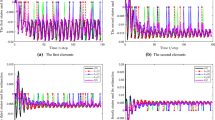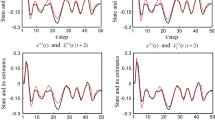Abstract
In this paper, the stability of the matrix-weighted distributed fusion (MWDF) estimation algorithm is analyzed for complex networked systems with different uniformly sampling rates, time delays and fading measurement rates. First, the MWDF estimation algorithm is reformulated. Then, the asymptotic stability and steady-state property of local estimator are proven under the proper conditions. Furthermore, the period steady-state properties of the local estimator, cross-covariance matrices, and MWDF estimator are proven. Finally, a numerical example is given to illustrate the period-stability property of the MWDF estimator.

Similar content being viewed by others
Explore related subjects
Discover the latest articles, news and stories from top researchers in related subjects.References
Sun SL, Lin HL, Li XY et al (2017) Multi–sensor distributed fusion estimation with applications in networked systems: a review paper. Inform Fusion 38:122–134
Anderson BD, Moore JB (1979) Optimal filtering. Prentice-Hall, Englewood Cliffs
Sun SL, Deng ZL (2004) Multi–sensor optimal information fusion Kalman filter. Automatica 40(6):1017–1023
Yan LP, Li XR, Xia YQ et al (2015) Modeling and estimation of asynchronous multirate multisensor system with unreliable measurements. IEEE Trans Aerosp Electron Syst 51(3):2012–2026
Hu J, Wang ZD, Chen DY et al (2016) Estimation, filtering and fusion for networked systems with network–induced phenomena: new progress and prospects. Inform Fusion 31:65–75
Yin Y, Zhuang G, Xia J et al (2022) Asynchronous H∞ filtering for singular markov jump neural networks with mode-dependent time-varying delays. Neural Process Lett 54:5439–5456
Liu WQ, Tao GL, Shen C (2021) Robust measurement fusion steady-state estimator design for multisensor networked systems with random two-step transmission delays and missing measurements. Math Comput Simul 181:242–283
Cao YY, Liu N, Zhang CF, Zhang T et al (2022) Synchronization of multiple reaction–diffusion memristive neural networks with known or unknown parameters and switching topologies. Knowledge-Based Syst 254:109595
Cao YY, Cao YT, Guo ZY, Huang TW et al (2020) Global exponential synchronization of delayed memristive neural networks with reaction–diffusion terms. Neural Net 123:70–81
Liu WQ, Tao GL (2021) Robust fusion steady-state estimators for networked stochastic uncertain systems with packet dropouts and missing measurements. Opt Control Appl Methods 42(3):629–659
Sun SL (2013) Optimal linear filters for discrete–time systems with randomly delayed and lost measurements with/without time stamps. IEEE Trans Autom Control 58(6):1551–1556
Hu J, Wang ZD, Gao HJ (2013) Recursive filtering with random parameter matrices, multiple fading measurements and correlated noises. Automatica 49(11):3440–3448
Guo Y, Huang B (2015) State estimation incorporating infrequent, delayed and integral measurements. Automatica 58:32–38
Zhai DH, Xia YQ (2016) Adaptive control for teleoperation system with varying time-delays and input saturation constraints. IEEE Trans Industr Electron 63(11):6921–6929
Lin H L, Sun S L (2018) Distributed CI fusion estimation for non-uniform sampling systems with fading measurements. In : proceedings of 37th Chinese control Conference, Wuhan, China, pp 4395–4400
Mahmoud M, Emzir M (2012) State estimation with asynchronous multirate multismart sensors. Inf Sci 196(1):15–27
Zhang HC, Basin MV, Skliar M (2007) Itô-Volterra optimal state estimation with continuous, multirate, randomly sampled, and delayed measurements. IEEE Trans Autom Control 52(3):401–416
Fatehi A, Huang B (2017) Kalman filtering approach to multi–rate information fusion in the presence of irregular sampling rate and variable measurement delay. J Process Control 53:15–25
Lin HL, Sun SL (2017) A solution to estimation fusion for multirate measurements with delays”. IEEE Trans Aerosp Electron Syst 53(6):3020–3031
Lin H L, Sun S L (2019) Distributed fusion estimation for multi–rate multi-sensor time–delayed systems with fading measurements. In: proceedings of 38nd Chinese control conference, Guangzhou, China, pp 3691–3696
Sun SL, Peng FF, Lin HL (2018) Distributed asynchronous fusion estimator for stochastic uncertain systems with multiple sensors of different fading measurement rates. IEEE Trans Signal Process 66(3):641–653
Tian T, Sun SL (2021) Distributed fusion estimation for multisensor multirate systems with packet dropout compensations and correlated noises. IEEE Trans Syst Man, Cyber Syst 51(9):5762–5772
Funding
This work was supported by the National Natural Science Foundation of China (NSFC-61903128, NSFC-61573132), by Natural Science Foundation of Heilongjiang Province (YQ2022F016), Postdoctoral Fund of China (2020M670938), Postdoctoral Fund of Heilongjiang Province of China (LBH-Z19091), Young Innovative Talents Training Program of Universities in Heilongjiang Province of China (UNPYSCT-2020001), Heilongjiang University Outstanding Youth Fund of China (JCL202101), and Information Fusion Estimation and Detection Provincial Key Laboratory.
Author information
Authors and Affiliations
Contributions
Honglei Lin wrote the main manuscript text and Shuli Sun proposed the algorithm. Both authors reviewed the manuscript.
Corresponding author
Ethics declarations
Conflict of interest
The authors declare no competing interests.
Additional information
Publisher's Note
Springer Nature remains neutral with regard to jurisdictional claims in published maps and institutional affiliations.
Rights and permissions
Springer Nature or its licensor (e.g. a society or other partner) holds exclusive rights to this article under a publishing agreement with the author(s) or other rightsholder(s); author self-archiving of the accepted manuscript version of this article is solely governed by the terms of such publishing agreement and applicable law.
About this article
Cite this article
Lin, H., Sun, S. Stability Analysis of Distributed Fusion Estimation Algorithm for Complex Networked Systems. Neural Process Lett 55, 6781–6795 (2023). https://doi.org/10.1007/s11063-023-11160-0
Accepted:
Published:
Issue Date:
DOI: https://doi.org/10.1007/s11063-023-11160-0





